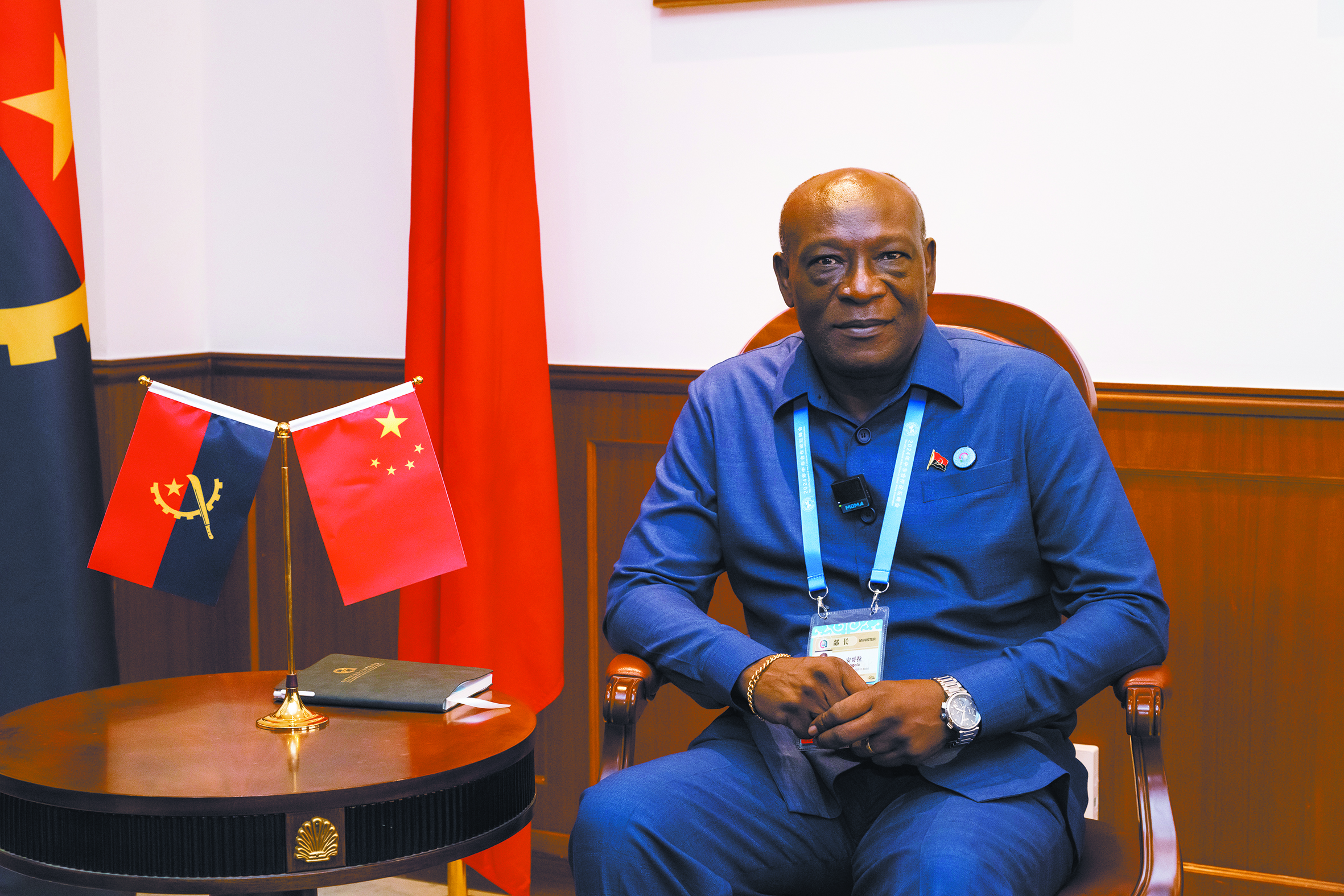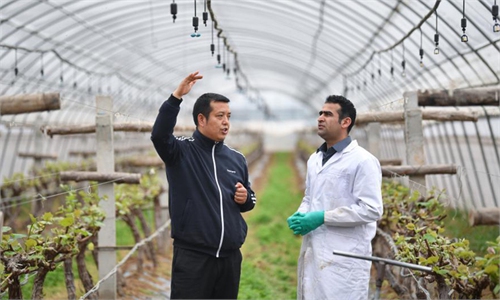Exclusive: China-Angola ties see great potential as official highlights visible benefits of bilateral cooperation under the Belt and Road Initiative
Benefits of China-Angola bilateral collaboration under BRI visible: official
Editor's Note:
In recent years, under China-proposed Belt and Road Initiative (BRI), practical cooperation between China and Angola has yielded substantial results. Angola has become China's second-largest African trading partner, while China is Angola's largest trade partner. An increasing number of Chinese enterprises are investing and operating in Angola, actively participating in the country's economic diversification process.
The total investment by Chinese companies in Angola now exceeds $24 billion, with agriculture being an important area of cooperation, according to the Chinese Embassy in Angola. During the just-concluded 2024 Summit of the Forum on China-Africa Cooperation (FOCAC) in Beijing, António Francisco de Assis (Assis), the Minister of Agriculture and Forestry of Angola, talked with the Global Times (GT) reporter Yin Yeping about how his country benefited from the BRI. He also refuted smears by some Western media targeting the initiative.

GT: China is a major player in global agriculture. How do you think Angola could collaborate with China to enhance agricultural modernization?
Assis: We have extensive arable land suitable for agriculture and a very favorable climate. However, we have faced significant challenges during the war. Currently, our primary objective is food security, which is why Angola has chosen China as its key partner to develop the agricultural sector.
We are working on two main fronts. The first is in the institutional sector, where we are collaborating with agrarian institutes from both China and Angola.
The second front involves B2B cooperation, where companies from both countries are working together on production in areas such as fruits, livestock, and forestry. Previously, Angola imported nearly everything, but we have dramatically reduced food imports by encouraging local production. Chinese companies are also assisting Angolan farmers in producing food locally as part of our efforts to decrease our reliance on imports.
GT: How would you assess the impact of China's BRI on Angola's social, economic, and agricultural development? What are your expectations for strengthening this cooperation in the future?
Assis: The benefits of China-Angola cooperation under the BRI are clearly visible, and we take great pride in this. As soon as the civil war ended in Angola, China was one of the first countries to provide valuable support to Angola. China supported us in building essential infrastructure, including roads, bridges, railways, and water supply systems. China has also been instrumental in improving our electricity supply.
In terms of agriculture, the results of our cooperation with China have been very positive. As the Minister of Agriculture and Forestry, I can say that the result of our cooperation with China is very positive.
For example, China has established many agricultural technology centers in Africa that will help us address the issue of food security.
Our cooperation extends beyond the agricultural sector, and while we have seen substantial presence and progress in agriculture, there is still much to be done. We aim to further increase and enhance our collaboration in the future.
GT: Some Western media frequently claimed that China is trying to exert so-called influence through its cooperation and aid to Africa. What is your response to this?
Assis: We don't have to pay too much attention to the Western media. Additionally, it is not these media outlets that have helped Angola resolve the problem of the previous drought in the southern part of our country.
Angola has built more than 160 kilometers of canal to bring water to areas suffering from severe drought. It was done by a Chinese company called Sinohydro, which is also helping us build many dams. If Western media are interested, I am very open to inviting them to see the results achieved by Chinese companies in Angola.
We are developing many projects in the country, which is very positive. Some countries are expressing concerns and bringing up these issues because they are worried. They used to export a lot of food to Angola, but now that Angola has started producing its own food, they are concerned because there is less demand for their products than before.
The most important thing is that we should consolidate our cooperation process. The benefits should be mutual. That should be our main focus.
GT: How do you comment on the significance of 2024 FOCAC summit in Beijing in terms of its boost to China-Africa relations as well as China-Angola ties?
Assis: An important topic highlighted at the forum is the sharing of knowledge. I believe that training personnel and sharing technology will significantly accelerate the development of the agricultural sector on our continent.
One crucial aspect of our future cooperation involves capacity building and technology transfer. China has advanced agricultural technologies that we can learn from, particularly in terms of how these technologies can be adapted and transferred to the future development of African countries including Angola. We are very eager to strengthen this cooperation on both sides.
In recent years, under China-proposed Belt and Road Initiative (BRI), practical cooperation between China and Angola has yielded substantial results. Angola has become China's second-largest African trading partner, while China is Angola's largest trade partner. An increasing number of Chinese enterprises are investing and operating in Angola, actively participating in the country's economic diversification process.
The total investment by Chinese companies in Angola now exceeds $24 billion, with agriculture being an important area of cooperation, according to the Chinese Embassy in Angola. During the just-concluded 2024 Summit of the Forum on China-Africa Cooperation (FOCAC) in Beijing, António Francisco de Assis (Assis), the Minister of Agriculture and Forestry of Angola, talked with the Global Times (GT) reporter Yin Yeping about how his country benefited from the BRI. He also refuted smears by some Western media targeting the initiative.

António Francisco de Assis Photo: Chen Tao/GT
GT: China is a major player in global agriculture. How do you think Angola could collaborate with China to enhance agricultural modernization?
Assis: We have extensive arable land suitable for agriculture and a very favorable climate. However, we have faced significant challenges during the war. Currently, our primary objective is food security, which is why Angola has chosen China as its key partner to develop the agricultural sector.
We are working on two main fronts. The first is in the institutional sector, where we are collaborating with agrarian institutes from both China and Angola.
The second front involves B2B cooperation, where companies from both countries are working together on production in areas such as fruits, livestock, and forestry. Previously, Angola imported nearly everything, but we have dramatically reduced food imports by encouraging local production. Chinese companies are also assisting Angolan farmers in producing food locally as part of our efforts to decrease our reliance on imports.
GT: How would you assess the impact of China's BRI on Angola's social, economic, and agricultural development? What are your expectations for strengthening this cooperation in the future?
Assis: The benefits of China-Angola cooperation under the BRI are clearly visible, and we take great pride in this. As soon as the civil war ended in Angola, China was one of the first countries to provide valuable support to Angola. China supported us in building essential infrastructure, including roads, bridges, railways, and water supply systems. China has also been instrumental in improving our electricity supply.
In terms of agriculture, the results of our cooperation with China have been very positive. As the Minister of Agriculture and Forestry, I can say that the result of our cooperation with China is very positive.
For example, China has established many agricultural technology centers in Africa that will help us address the issue of food security.
Our cooperation extends beyond the agricultural sector, and while we have seen substantial presence and progress in agriculture, there is still much to be done. We aim to further increase and enhance our collaboration in the future.
GT: Some Western media frequently claimed that China is trying to exert so-called influence through its cooperation and aid to Africa. What is your response to this?
Assis: We don't have to pay too much attention to the Western media. Additionally, it is not these media outlets that have helped Angola resolve the problem of the previous drought in the southern part of our country.
Angola has built more than 160 kilometers of canal to bring water to areas suffering from severe drought. It was done by a Chinese company called Sinohydro, which is also helping us build many dams. If Western media are interested, I am very open to inviting them to see the results achieved by Chinese companies in Angola.
We are developing many projects in the country, which is very positive. Some countries are expressing concerns and bringing up these issues because they are worried. They used to export a lot of food to Angola, but now that Angola has started producing its own food, they are concerned because there is less demand for their products than before.
The most important thing is that we should consolidate our cooperation process. The benefits should be mutual. That should be our main focus.
GT: How do you comment on the significance of 2024 FOCAC summit in Beijing in terms of its boost to China-Africa relations as well as China-Angola ties?
Assis: An important topic highlighted at the forum is the sharing of knowledge. I believe that training personnel and sharing technology will significantly accelerate the development of the agricultural sector on our continent.
One crucial aspect of our future cooperation involves capacity building and technology transfer. China has advanced agricultural technologies that we can learn from, particularly in terms of how these technologies can be adapted and transferred to the future development of African countries including Angola. We are very eager to strengthen this cooperation on both sides.



